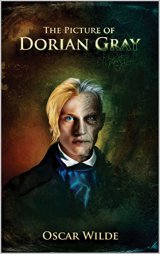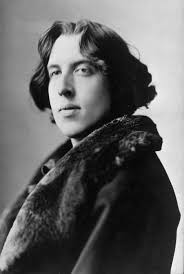The Picture of Dorian Gray Page #6
The Picture of Dorian Gray is a Gothic and philosophical novel by Oscar Wilde, first published complete in the July 1890 issue of Lippincott's Monthly Magazine. Fearing the story was indecent, prior to publication the magazine's editor deleted roughly five hundred words without Wilde's knowledge.
"Just turn your head a little more to the right, Dorian, like a good boy," said the painter, deep in his work and conscious only that a look had come into the lad's face that he had never seen there before. "And yet," continued Lord Henry, in his low, musical voice, and with that graceful wave of the hand that was always so characteristic of him, and that he had even in his Eton days, "I believe that if one man were to live out his life fully and completely, were to give form to every feeling, expression to every thought, reality to every dream--I believe that the world would gain such a fresh impulse of joy that we would forget all the maladies of mediaevalism, and return to the Hellenic ideal--to something finer, richer than the Hellenic ideal, it may be. But the bravest man amongst us is afraid of himself. The mutilation of the savage has its tragic survival in the self-denial that mars our lives. We are punished for our refusals. Every impulse that we strive to strangle broods in the mind and poisons us. The body sins once, and has done with its sin, for action is a mode of purification. Nothing remains then but the recollection of a pleasure, or the luxury of a regret. The only way to get rid of a temptation is to yield to it. Resist it, and your soul grows sick with longing for the things it has forbidden to itself, with desire for what its monstrous laws have made monstrous and unlawful. It has been said that the great events of the world take place in the brain. It is in the brain, and the brain only, that the great sins of the world take place also. You, Mr. Gray, you yourself, with your rose-red youth and your rose-white boyhood, you have had passions that have made you afraid, thoughts that have filled you with terror, day-dreams and sleeping dreams whose mere memory might stain your cheek with shame--" "Stop!" faltered Dorian Gray, "stop! you bewilder me. I don't know what to say. There is some answer to you, but I cannot find it. Don't speak. Let me think. Or, rather, let me try not to think." For nearly ten minutes he stood there, motionless, with parted lips and eyes strangely bright. He was dimly conscious that entirely fresh influences were at work within him. Yet they seemed to him to have come really from himself. The few words that Basil's friend had said to him--words spoken by chance, no doubt, and with wilful paradox in them--had touched some secret chord that had never been touched before, but that he felt was now vibrating and throbbing to curious pulses. Music had stirred him like that. Music had troubled him many times. But music was not articulate. It was not a new world, but rather another chaos, that it created in us. Words! Mere words! How terrible they were! How clear, and vivid, and cruel! One could not escape from them. And yet what a subtle magic there was in them! They seemed to be able to give a plastic form to formless things, and to have a music of their own as sweet as that of viol or of lute. Mere words! Was there anything so real as words? Yes; there had been things in his boyhood that he had not understood. He understood them now. Life suddenly became fiery-coloured to him. It seemed to him that he had been walking in fire. Why had he not known it? With his subtle smile, Lord Henry watched him. He knew the precise psychological moment when to say nothing. He felt intensely interested. He was amazed at the sudden impression that his words had produced, and, remembering a book that he had read when he was sixteen, a book which had revealed to him much that he had not known before, he wondered whether Dorian Gray was passing through a similar experience. He had merely shot an arrow into the air. Had it hit the mark? How fascinating the lad was! Hallward painted away with that marvellous bold touch of his, that had the true refinement and perfect delicacy that in art, at any rate comes only from strength. He was unconscious of the silence. "Basil, I am tired of standing," cried Dorian Gray suddenly. "I must go out and sit in the garden. The air is stifling here." "My dear fellow, I am so sorry. When I am painting, I can't think of anything else. But you never sat better. You were perfectly still. And I have caught the effect I wanted--the half-parted lips and the bright look in the eyes. I don't know what Harry has been saying to you, but he has certainly made you have the most wonderful expression. I suppose he has been paying you compliments. You mustn't believe a word that he says." "He has certainly not been paying me compliments. Perhaps that is the reason that I don't believe anything he has told me." "You know you believe it all," said Lord Henry, looking at him with his dreamy languorous eyes. "I will go out to the garden with you. It is horribly hot in the studio. Basil, let us have something iced to drink, something with strawberries in it." "Certainly, Harry. Just touch the bell, and when Parker comes I will tell him what you want. I have got to work up this background, so I will join you later on. Don't keep Dorian too long. I have never been in better form for painting than I am to-day. This is going to be my masterpiece. It is my masterpiece as it stands." Lord Henry went out to the garden and found Dorian Gray burying his face in the great cool lilac-blossoms, feverishly drinking in their perfume as if it had been wine. He came close to him and put his hand upon his shoulder. "You are quite right to do that," he murmured. "Nothing can cure the soul but the senses, just as nothing can cure the senses but the soul." The lad started and drew back. He was bareheaded, and the leaves had tossed his rebellious curls and tangled all their gilded threads. There was a look of fear in his eyes, such as people have when they are suddenly awakened. His finely chiselled nostrils quivered, and some hidden nerve shook the scarlet of his lips and left them trembling. "Yes," continued Lord Henry, "that is one of the great secrets of life--to cure the soul by means of the senses, and the senses by means of the soul. You are a wonderful creation. You know more than you think you know, just as you know less than you want to know." Dorian Gray frowned and turned his head away. He could not help liking the tall, graceful young man who was standing by him. His romantic, olive-coloured face and worn expression interested him. There was something in his low languid voice that was absolutely fascinating. His cool, white, flowerlike hands, even, had a curious charm. They moved, as he spoke, like music, and seemed to have a language of their own. But he felt afraid of him, and ashamed of being afraid. Why had it been left for a stranger to reveal him to himself? He had known Basil Hallward for months, but the friendship between them had never altered him. Suddenly there had come some one across his life who seemed to have disclosed to him life's mystery. And, yet, what was there to be afraid of? He was not a schoolboy or a girl. It was absurd to be frightened.
Translation
Translate and read this book in other languages:
Select another language:
- - Select -
- 简体中文 (Chinese - Simplified)
- 繁體中文 (Chinese - Traditional)
- Español (Spanish)
- Esperanto (Esperanto)
- 日本語 (Japanese)
- Português (Portuguese)
- Deutsch (German)
- العربية (Arabic)
- Français (French)
- Русский (Russian)
- ಕನ್ನಡ (Kannada)
- 한국어 (Korean)
- עברית (Hebrew)
- Gaeilge (Irish)
- Українська (Ukrainian)
- اردو (Urdu)
- Magyar (Hungarian)
- मानक हिन्दी (Hindi)
- Indonesia (Indonesian)
- Italiano (Italian)
- தமிழ் (Tamil)
- Türkçe (Turkish)
- తెలుగు (Telugu)
- ภาษาไทย (Thai)
- Tiếng Việt (Vietnamese)
- Čeština (Czech)
- Polski (Polish)
- Bahasa Indonesia (Indonesian)
- Românește (Romanian)
- Nederlands (Dutch)
- Ελληνικά (Greek)
- Latinum (Latin)
- Svenska (Swedish)
- Dansk (Danish)
- Suomi (Finnish)
- فارسی (Persian)
- ייִדיש (Yiddish)
- հայերեն (Armenian)
- Norsk (Norwegian)
- English (English)
Citation
Use the citation below to add this book to your bibliography:
Style:MLAChicagoAPA
"The Picture of Dorian Gray Books." Literature.com. STANDS4 LLC, 2025. Web. 16 Mar. 2025. <https://www.literature.com/book/the_picture_of_dorian_gray_869>.








Discuss this The Picture of Dorian Gray book with the community:
Report Comment
We're doing our best to make sure our content is useful, accurate and safe.
If by any chance you spot an inappropriate comment while navigating through our website please use this form to let us know, and we'll take care of it shortly.
Attachment
You need to be logged in to favorite.
Log In